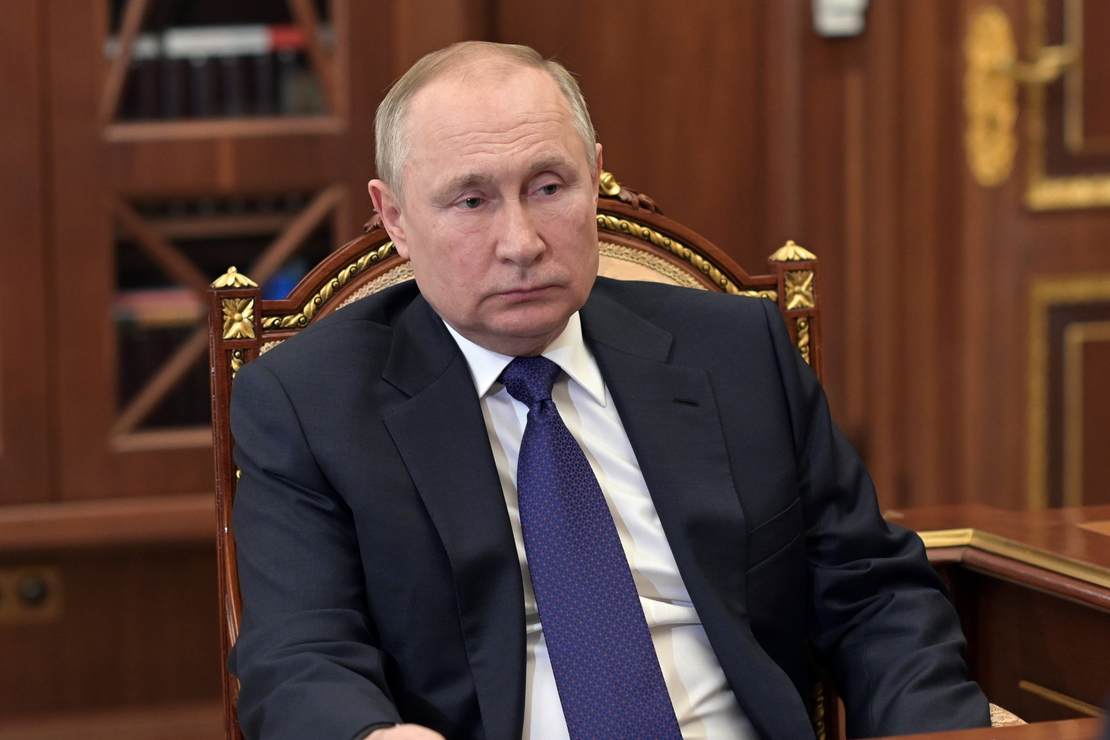
There’s enough circumstantial evidence of a health problem floating around that it’s worth giving this some attention. What kind of circumstantial evidence? Well…
1. There’s the small matter of Putin frequently not allowing his own advisors to come within 30 feet of him in public. Not even the most skittish progressive COVID hawk in the U.S. is as seemingly anxious as he is about catching the virus. For someone to be that concerned, one would think they’d need to have a serious underlying health problem that might plausibly put their life in danger if they’re infected.
2. The war in Ukraine seems so misbegotten that the easiest way to explain it is as a desperate legacy play by a dying man. If Putin had the faintest idea about the strength of his forces and Ukraine’s, he surely would have done things differently — unless he’s so worried about imminent death that he thought this was his last chance to become the ruler who absorbed Ukraine into Russia, whether the Russian military was ready for that task or not.
3. His face is noticeably “puffier” than it was 20 years ago. It doesn’t look like it’s due to weight gain either. Some have speculated that he’s receiving steroids for an unknown medical condition.
4. There have been rumors:
I wish I could share more,but for now I can say it’s pretty obvious to many that something is off with #Putin
He has always been a killer,but his problem now is different & significant
It would be a mistake to assume this Putin would react the same way he would have 5 years ago
— Marco Rubio (@marcorubio) February 26, 2022
Wishful thinking or something more? According to a new report from a now-banned Russian investigative outlet called Proekt (Project), comparing Putin’s movements with government records reveals that certain doctors have repeatedly found their way into his company over the last few years. And I do mean “repeatedly.”
Maybe he just likes hanging out with cancer specialists?
The Russian investigative outlet Proekt matched the dates of Putin’s official visits to Sochi or unexplained disappearances from public view with local hotel accommodation contracts published on the government procurement website to make the connection. An average of five doctors had accompanied Putin in 2016-17 and nine doctors in 2019, it said…
According to Proekt’s investigation, a group of presidential hospital doctors, nurses and senior executives “may have performed surgery” on Putin in November 2016. At least two members of this group were later reportedly awarded and promoted…
Proekt said the records showed a surgeon specializing in thyroid cancer had spent 166 days in Sochi between 2016 and 2019. This was the longest period spent there by a presidential hospital doctor with the exception of an ear, nose and throat doctor whose visits totaled 282 days.
READ RELATED: Thursday Cartoon: Biology Is a Social Construct…
This Daily Mail story summarizes the Proekt findings at greater length. Evidently at least two doctors with thyroid practices have been linked to Putin. One is a respected surgeon at Moscow’s Central Clinical Hospital who’s been to Sochi to see him at least 35 times; a second surgeon with ENT training “who, among other things, can be the first to detect problems with the thyroid gland, including oncological ones” has made at least 59 trips, and his father was recently made an MP in Putin’s party.
Supposedly an average of five doctors have accompanied him on trips to Sochi. Normally I’d chalk that up to an autocrat’s paranoia about his health and plots against his life, wanting a medical team near him at all times in the event of foul play. But if Proekt is right about two thyroid specialists being part of the detail: Hmmmmmmm.
If Putin really is in dire straits, which way does that cut for the future of the war in Ukraine? On the one hand, a Russian retreat in the north would seem unlikely since a dying man with delusions of grandeur would have no reason to back down. But that retreat really is happening, the WSJ reports: “Ukrainian officials were initially skeptical of Russian announcements that Moscow would limit military operations near Kyiv and Chernihiv, but lengthy convoys of Russian armor began leaving these areas Thursday, and scores of villages in northern Ukraine have been retaken by Ukrainian troops.” Evidence:
West of Kyiv we saw the massive losses Russian troops incurred while trying to invade Ukraine‘s capital. It seems they had no strategy or tactics at all. #CNN #Ukraine #Russia pic.twitter.com/YkzzZv5IwV
— Frederik Pleitgen (@fpleitgenCNN) April 1, 2022
If Putin’s willing to tolerate scenes like that by withdrawing, maybe he’s not desperate.
On the other hand, the prospect of taxing his army with a futile task to the point that it breaks down in the field and disintegrates would be his worst nightmare, an historic humiliation for him and Russia. Faced with that possibility if he stuck with his plans for a national takeover of Ukraine, maybe he made a cold-eyed calculation that at least conquering the Donbas will give him some sort of legacy if not the one he was hoping for. If that’s his thinking then he really might be in dire straits.
Either way, says the Journal, Russia’s pivot to eastern Ukraine has all the makings of a long war of attrition. Especially if western powers start supplying the Ukrainians with offensive weapons like tanks and artillery.
Russia’s “military and political strategy hasn’t changed, it remains to annihilate Ukraine,” said Andriy Zagorodnyuk, a former Ukrainian minister of defense who advises President Volodymyr Zelensky’s government. But he said, “Now, their capabilities no longer match their strategic vision.”
That could be a recipe for a prolonged conflict, increasing the stakes for both sides’ ability to raise troops and money and access weapons, ammunition and supplies…
“The next three weeks will determine whether Russia’s war of attrition can succeed. If we, the West, have the sense of urgency and can provide Ukraine with what it’s been begging for, then they can break the back of the Russians while the Russians are down, and can win,” said retired Lt. Gen. Ben Hodges, a former commander of the U.S. Army in Europe. “But if we don’t have that sense of urgency, the Russians will have the time to regroup, to re-establish logistics, and to continue grinding down Ukrainian cities and Ukrainian armed forces.”
Putin may present the conquest of the Donbas as a glorious victory, assuming his army can even pull it off. But will the Russian public accept it as one? Watch this clip. No one should underestimate the ability of Kremlin propaganda to influence domestic opinion, but even Russian citizens inclined to make excuses for Putin will inevitably wonder how a massive “special military operation” involving virtually all available forces resulted in Russia gaining control of only two small provinces that were already in dispute. How does he come out of this with his prestige intact?
That’s how Putin’s core supporters feel. They don’t view results as a victory. They percieve it as a shame. Putin rose stakes too high and his demands for neutral non-nuclear status are viewed as a domestic policy tool. He needs to present a victory, but nobody believes he’s won pic.twitter.com/ruiHAO3zon
— Kamil Galeev (@kamilkazani) April 1, 2022
Source:




